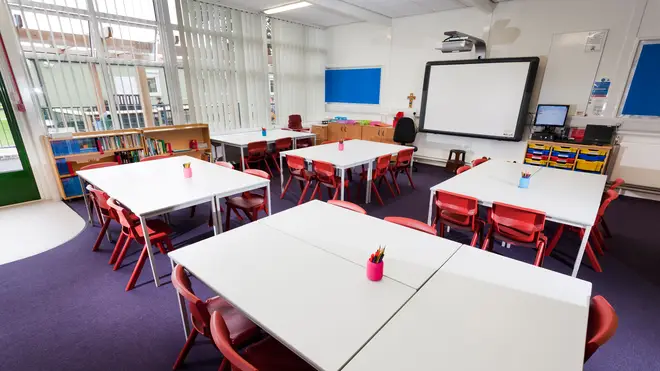
Tom Swarbrick 4pm - 7pm
14 August 2022, 18:55 | Updated: 14 August 2022, 18:56

Schools across the country are holding 'crisis meetings' to consider three-day working weeks as they the struggle to pay soaring energy costs and staff salary rises.
Headteachers are in talks with school governors and trustees over the summer holidays about how best to number crunch in the next academic year, with budgets stretched to the max amid the cost of living crisis.
Teachers are also set to be awarded pay rises in September which experts warn will add more pressure on schools' already-tight finances.
Marc Jordan, CEO of Creative Education Trust, which has 17 schools in the Midlands and East Anglia, told The Telegraph that some schools were even considering three-day working weeks in a bid to save cash.
Dr Robin Bevan, headmaster of Southend High School for Boys in Essex, also told the newspaper: "If a four-day week is not already being planned, it will certainly be being considered' by some schools."
Other desperate measures could include recruitment freezes, scrapping covid catch up programs, binning building improvements and planning redundancies.
Read more: Jack Monroe hits out at 'tone deaf' Govt and slams energy companies for 'playing us for fools'

Brown: Cost of living crisis is national emergency
Mr Jordan also predicted schools will be forced to resort to using "draconian restrictions on energy usage" as energy bills skyrocket to around 300 per cent more than last year.
It comes as funding per pupil in England has collapsed by nine percent between 2010 and 2020 in real terms despite the Government's additional £7billion for school budgets in England by 2024.
A spokesman for the Department for Education said: "We recognise that schools – much like the wider economy – are facing increased costs, including on energy and staff pay.
''Our schools white paper set out our expectation that the school week should last a minimum of 32.5 hours – the current average – for all mainstream state-funded schools.
"Thousands of schools already deliver this length of week within existing budgets and we expect current funding plans to account for this."

'I hear almost hourly from people who are absolutely petrified.'
The two remaining Tory leadership contenders are facing a call to more than double the level of Government support to low-income families to avert a cost-of-living crisis "catastrophe" over the winter.
On Saturday seventy charities and community organisations signed an open letter to Liz Truss and Rishi Sunak warning families on benefits face a £1,600 shortfall over the coming months, despite receiving £1,200 in the last Government support package.
Read more: Crisis talks set to 'knock heads together' as bills soar while energy firms announce bumper profits
In the letter, co-ordinated by the Joseph Rowntree Foundation (JRF), they warn soaring energy bills mean many low-income households are already facing in a choice between skipping meals or not heating their homes properly, and that the situation is only set to get worse.
"Many of our organisations work directly with these families and are becoming overwhelmed, too often unable to provide the support so desperately needed," the letter said.
"This situation cannot be allowed to continue.
"As the prospective leaders of this country, we urge you to act now to demonstrate the compassion and leadership needed to tackle this issue head on.
"We ask you both to pledge that, under your premiership, everyone who needs it will be properly supported when they hit hard times.
"This means ensuring that, at a minimum, the social security system always provides people with enough to be able to afford the essentials."